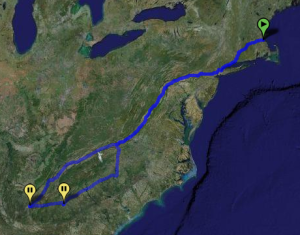What a weekend. I got back last night from my trip to Atlanta, Georgia, and Birmingham, Alabama. My friend from college, Thomas, got married to his gorgeous girlfriend, Jennie.

It was a helluva trip. We went to Waffle House a million times, drank every night and saw the biggest aquarium in the world. We even got in an accident and stood on the side of the freeway in the sweltering Georgia heat for an hour and a half. All of this was before the wedding even started.
The wedding was fantastically lavish and incredibly swanky, not to mention an absolute blast. Thomas and Jennie make a beautiful couple and their friends and family are second to none. Everyone I met was incredibly nice and generous, which was a nice break from New England “hospitality.”
It was, however, incredibly hot in Alabama in August. I wish someone had told me that would be the case. Birmingham is impossible to get around; all the streets look the same. And all the streets are really three-lane highways; half of the time we were driving was spent cutting people off to get to the right lane for our turn. I can certainly understand why no one walks anywhere in either Atlanta or Birmingham.
I flew back on Continental Express, so I got to fly in a (relatively) small plane. It was a nice experience but the flight attendant was a little odd. She did the usual “turn off your electronic shit” thing but then insisted that people remove their headphones even if the device to which they were attached was off. One guy had the gall to argue with her, so she got on the PA and threatened to have him met at the runway by FAA/TSA/FBI agents for questioning. It was a little vindictive and not very becoming of a person who purports to provide good customer service.


